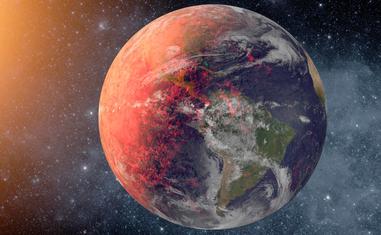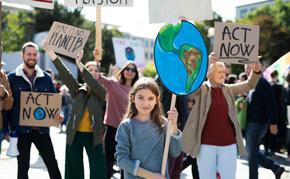The views expressed in our content reflect individual perspectives and do not represent the authoritative views of the Baha'i Faith.
Scientists have sounded the alarms on climate for decades — but this analysis by the National Oceanic and Atmospheric Administration describes some of the immediate impacts the whole world faces.
We’re used to thinking about climate change as a gradually-developing, slow-acting, and even distant problem, as an issue for the future, as something our children or grandchildren will have to face. But as the NOAA report makes clear, climate change is here:
Impacts from climate change are happening now. These impacts extend well beyond an increase in temperature, affecting ecosystems and communities in the United States and around the world. Things that we depend upon and value – water, energy, transportation, wildlife, agriculture, ecosystems, and human health – are experiencing the effects of a changing climate.
The world has attempted to respond to these planetary challenges in many different ways — through global treaties, national legislation, governmental policy changes, and individual actions and advocacy. But what can people of faith do? What contributions could the world’s organized religious communities make to help address the problem?
RELATED: How Global Governance Can Address Climate Change
Arise for the Reformation of This Age
They can, the Baha’i teachings recommend in the writings of Baha’u’llah, the prophet and founder of the Baha’i Faith, do everything possible to build unity, not only among their fellow believers but across the boundaries between religions:
O ye children of men! The fundamental purpose animating the Faith of God and His Religion is to safeguard the interests and promote the unity of the human race, and to foster the spirit of love and fellowship amongst men. … Our hope is that the world’s religious leaders and the rulers thereof will unitedly arise for the reformation of this age and the rehabilitation of its fortunes. Let them, after meditating on its needs, take counsel together and, through anxious and full deliberation, administer to a diseased and sorely-afflicted world the remedy it requireth ….
Think of it — a “UN of religions,” which would bring together the world’s religious leaders for “anxious and full deliberation” and then administer the spiritual remedies the world so clearly needs.
Of course, not everyone has a religion — but the vast majority of people, probably somewhere near 85 percent of the entire human population, follow one of the world’s major faiths. Imagine what those billions of people might do if they began to see climate change as a crucial spiritual issue rather than just a scientific or policy matter.
Applying a Moral Framework
Recently, the National Spiritual Assembly of the Baha’is of the United States wrote to the American Baha’is about this pressing issue, pointing out that we will need to come together as people, regardless of our religion, or lack of one, to tackle “the pressing issues of our age:”
Inextricably tied to the implications of applying a moral framework to our use of the Earth’s resources is participation. It is clear that tackling the pressing issues of our age – from climate change to economic inequality to racial prejudice – will require increasing levels of unity among individuals from all walks of life and involvement from all members of society.
RELATED: How to Be an Environmentalist—Spiritually
To help generate that unity, Baha’is will take part, with their friends and partners from all other religious backgrounds and communities, in Faith Climate Action Week, an annual initiative of Interfaith Power and Light, which happens this year between April 16–25. For 2021, FCAW’s theme is Sacred Ground: Cultivating Connections Between our Faith, our Food, and the Climate.
This broad-based interfaith initiative includes April 22 — “Earth Day” — which since 1970 has provided us all with a multitude of community-based opportunities to support the Earth’s environment.
The Baha’i International Community, headquartered at the UN in New York, weighed in on these questions almost a quarter-century ago, pointing out that:
As trustees, or stewards, of the planet’s vast resources and biological diversity, humanity must learn to make use of the earth’s natural resources, both renewable and non-renewable, in a manner that ensures sustainability and equity into the distant reaches of time. This attitude of stewardship will require full consideration of the potential environmental consequences of all development activities. It will compel humanity to temper its actions with moderation and humility, realizing that the true value of nature cannot be expressed in economic terms. It will also require a deep understanding of the natural world and its role in humanity’s collective development both material and spiritual.
Therefore, sustainable environmental management must come to be seen not as a discretionary commitment mankind can weigh against other competing interests, but rather as a fundamental responsibility that must be shouldered, a pre-requisite for spiritual development as well as the individual’s physical survival.
Those who believe in a divine Creator, then, have a deep responsibility to become conscientious stewards of God’s creation.

















Comments
Sign in or create an account
Continue with Facebookor